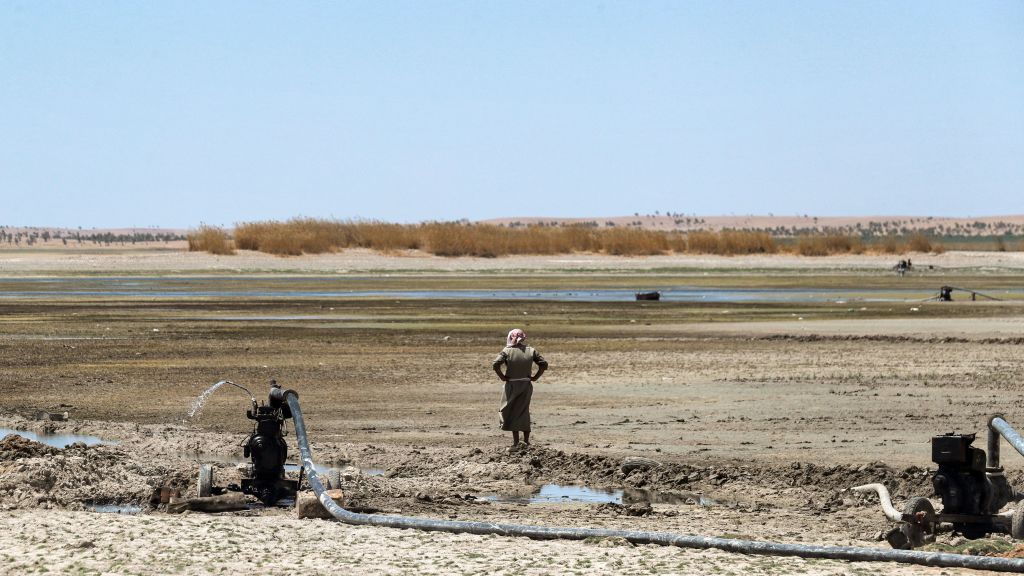Tigris–Euphrates basin states must come together to address water crisis

In a dramatic display of collective frustration, the streets of Baghdad recently became a theatre of dissent as around 300 Iraqis took to Nisour Square to protest acute water shortages. The demonstrations were held on 18 July near the Turkish embassy and marked a crucial moment in Iraq’s ongoing water crisis. They highlighted mounting tensions in the Middle East over shared water resources, the repercussions of climate change and poor governance.
The protests weren’t an isolated event. They were a manifestation of long-simmering discontent with the water crisis in Iraq. Faced with dwindling access to potable water and a significant decline in river levels, citizens took to the streets to demand accountability from a government perceived to have mishandled the nation’s most precious resource.
Iraq’s water scarcity comes back to its geography. It sits at an intricate intersection of water resources. The Tigris and Euphrates rivers, originating in neighbouring Turkey and Iran, respectively, are vital lifelines for Iraq. However, unyielding demand for water upstream has led these countries to construct dams and diversions that diminish flows downstream, devastating Iraq’s water supply.
The Baghdad protests drew attention to the delicate balance needed among nations that share water and the pressing need for cooperation in water management. Turkey’s and Iran’s dams on the Tigris and Euphrates have been contentious because they significantly alter flows downstream in Iraq. Tensions have made it challenging to achieve consensus on equitable sharing agreements, but also made diplomatic efforts to foster cooperation even more urgent.
Water is pivotal in any country’s development, but with Iraq experiencing sharp population growth and rising food demand, it’s feeling the pinch hardest. In Syria and Iraq, the Tigris and Euphrates supply the vast majority of water. The Euphrates provides around 85% of Syria’s renewable water, and the two rivers combined make up nearly 100% of Iraq’s supply. Ownership of the rivers’ basins is divided among Turkey, Syria, Iraq, Saudi Arabia and Jordan.
The Tigris originates in Hazar Lake in Anatolia and flows out of Turkey through Syria and Iraq before its confluence with the Euphrates at the Shatt al-Arab canal in southern Iraq. The water conflict in the Euphrates–Tigris basin has been ongoing since the 1960s with Turkey, Syria and Iraq competitively constructing large-scale water-supply schemes.
Diplomatic resolutions are complicated by the unpredictable flow of the Tigris, but Turkey’s control of 88.7% of the Euphrates basin’s water potential is the main strain on water relations. The Euphrates’ salinity has also been increasing beyond sustainable levels on the Syria–Iraq border, hindering irrigation. Yet all three countries have initiated extensive development plans to harness yet more of this water in hopes of achieving food security for their rapidly growing populations.
During the Syrian civil war, water was frequently used as a weapon. In May 2015, for instance, Islamic State took control of the Ramadi Dam in Iraq and reduced the outflow of the Euphrates River, diverting water into Lake Habbaniya. This drained the water supply of several provinces, hurting civilian communities. Other parties to the conflict in Syria also weaponised water access to punish or gain leverage over populations and exacerbated the already dire water crisis.
The war also severely damaged water infrastructure. Plants and pipes were hit directly by fighting, but also indirectly through energy infrastructure. This worsened the humanitarian crisis, leaving many Syrians without access to clean water for drinking, sanitation and agriculture.
Longstanding tension, environmental challenges and the impact of the war have combined to push the water crisis to a critical level. Addressing it will require not only sustainable water management practices in each country on the rivers; it will also require better conflict resolution, infrastructure and humanitarian aid across the region to protect access to clean water.
Meanwhile, climate change looms ominously over the Middle East. Rising temperatures and erratic precipitation patterns have disrupted the water cycle, reduced river flows and increased evaporation rates. Scarcity of water is a common challenge in the Middle East, with downstream states suffering the most, and water often triggers conflict as states compete to control it. While conflict is rare in regions with abundant water, areas with less often fight over vital supply sources. As the climate continues to change, Iraq’s water situation will deteriorate and strain the nation’s capacity even further.
Governance challenges have also affected Iraq’s ability to effectively manage water resources. Decades of conflict have severely hampered the maintenance and development of essential infrastructure. Mismanagement, corruption and a lack of coherent policies have compounded its water crisis, exacerbating discontent among Iraq’s citizens and highlighting the need for robust and accountable governance.
There have been steps in the right direction. Iraq recently joined the Convention on the Protection and Use of Transboundary Watercourses and International Lakes, becoming the first country in the Middle East to do so. The landmark decision makes Iraq the 49th party to the framework and reflects its commitment to cross-border cooperation on water. In addition, Iraq has chosen to participate in the United Nations Water Conference.
Iraq has also sought to better collaborate with Turkey, and in March they signed an agreement to double water releases from dams on the Tigris River for one month. During the same visit, Iraqi Prime Minister Mohammed Shia’ al-Sudani and Turkish President Recep Tayyip Erdogan reiterated their plans to establish a joint water resources research centre in Baghdad to cooperatively address water challenges and develop sustainable water management strategies.
With the region home to 12 of the most water-scarce countries on the planet, the significance of effective, collaborative water management cannot be understated. Communities in the Middle East rely on water that crosses international boundaries, and cooperation is needed to ensure its equitable access and responsible use.
